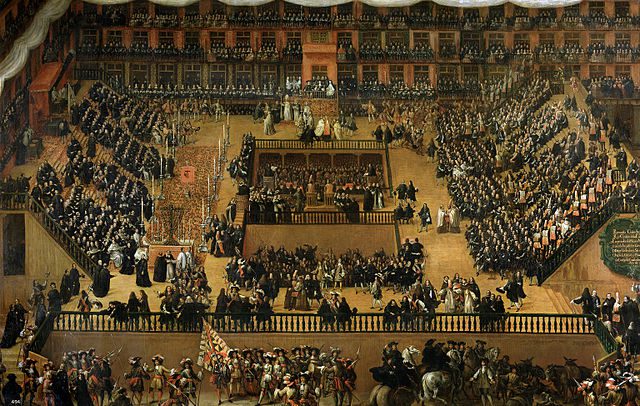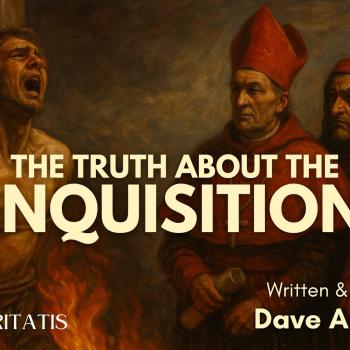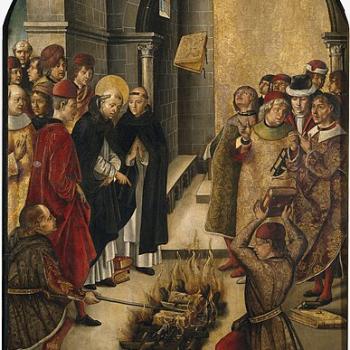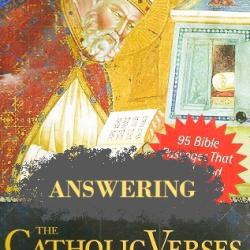
Auto de Fe in the Plaza Mayor of Madrid (1683), by Francisco Rizi (1614-1685) [public domain / Wikimedia Commons]
***
The Inquisition was the thing that troubled me most about the Catholic Church before I converted, and it still troubles me in a moral sense (but not from the standpoint that it disproves Catholic claims). I now understand much better, I think, why these things occurred, and what the Church has learned in the subsequent centuries. It goes back to the mediæval mindset and worldview.
Unless one makes some objective attempt to truly understand that, they will never remotely understand the Inquisition or the Crusades, as the sort of motives which propelled the mediævals are absolutely foreign to the modern relativist, indifferentist mental outlook — if not outright incomprehensible. The Inquisition represented an expansion (from what we have today) in the types of “crimes” which were regarded as a threat to society (to include heresy). Therefore, it was a different (and yes, flawed) understanding of what constituted societal threats.
In the Middle Ages, all heresy was pretty much regarded as obstinacy and in bad faith; evil will, etc. The Church today takes a much more psychologically nuanced approach: much heresy is believed in good faith; hence the adherent is less culpable; hence not guilty enough to be punished, etc. (i.e., on the human level: divine judgment being something else altogether). We have also learned that coercion is pointless, which was the original Christian position, anyway (before heresy became wrapped up in civil disorder, such as in the cases of the Donatists, Monophysites, Arians, and Albigensians, among others).
I would submit that these beliefs constituted every bit as much of a threat to both civil society and the Church as, say, the sanctity of life, absolutism, and sexual purity threatens the Sexual and Liberal Revolution and Culture of Death which we are currently blessed with. Beyond the strange, culture-destroying beliefs, the Albigensians were also less-than-saintly behavior-wise.
The well-known secular historian Will Durant wrote:
For some time the Cathari [a variant of Albigensianism] received a broad toleration from the ecclesiastics and the secular powers of southern France. Apparently the people were allowed to choose freely between the old religion and the new. Public debates were held between Catholic and Catharist theologians; one such took place at Carcassonne in the presence of a papal legate and King Pedro II of Aragon (1204). In 1167 various branches of the Cathari held a council of their clergy, attended by representatives from several countries; it discussed and regulated Catharist doctrine, discipline, and administration, and adjourned without having been disturbed . . .
. . . the nobles, relatively poor, began to seize Church property. In 1171 Roger II, Viscount of Béziers, sacked an abbey, threw the bishop of Albi into prison, and set a heretic to guard him. When the monks of Allet chose an abbot unsatisfactory to the Viscount, he burned the monastery and jailed the abbot; when the latter died the merry Viscount installed his corpse in the pulpit and persuaded the monks to choose a pleasing substitute. Raymond Roger, Count of Foix, drove abbot and monks from the abbey of Pamiers; his horses ate oats from the altar; his soldiers used the arms and legs of the crucifixes as pestles to grind grain, and practised their markmanship upon the image of Christ. Count Raymond VI of Toulouse destroyed several churches, persecuted the monks of Moissac, and was excommunicated (1196) . . .
Innocent III, coming to the papacy in 1198, saw in these developments a threat to both Church and state. He recognized some excuse for criticism of the Church, but he felt that he could hardly remain idle when the great ecclesiastical organization for which he had such lofty plans and hopes, and which seemed to him the chief bulwark against human violence, social chaos, and royal iniquity, was attacked in its very foundations, robbed of its possessions and dignity, and mocked with blasphemous travesties. The state too had committed sins and cherished corruption and unworthy officials, but only fools wished to destroy it. How could any continuing social order be built on the principles that forbade parentage and counseled suicide? Could any economy prosper on the idolatry of poverty and without the incentives of property? Could the relations of the sexes, and the rearing of children, be rescued from a wild disorder except by some such institution as marriage?
(The Age of Faith, New York: Simon & Schuster, 1950, 772-773)
This very eloquent and accurate statement was made by a non-Catholic, even a non-Christian humanist, and it gets right to the point; that in this instance, the heresy very much affected the civil as well as the ecclesiastical order. Civil societies do precisely the same thing, whether it is persecution of Communists from the right (McCarthyism) or the persecution of Christian pro-life and pro-family activists from the left (today) as “homophobes” and “anti-women” and “intolerant bigots” (say, if we dare to oppose Affirmative Action on the grounds that it harms the very people it ostensibly seeks to help). But again, I submit that the Church had far more worthy and rationally and ethically defensible motives.
Hilaire Belloc wrote, concerning the related Manichean “anti-matter” mentality:
But one thing the Manichean of every shade has always felt, and that is, that matter belongs to the evil side of things. Though there may be plenty of evil of a spiritual kind, yet good must be wholly spiritual. That is something you find not only in the early Manichean, not only in the Albigensian of the Middle Ages, but even in the most modern of the remaining Puritans. It seems indissolubly connected with the Manichean temper in every form. Matter is subject to decay and is therefore evil. Our bodies are evil. Their appetites are evil. This idea ramifies into all sorts of absurd details. Wine is evil. Pretty well any physical pleasure, or half-physical pleasure, is evil. Joy is evil. Beauty is evil. Amusements are evil – and so on . . . Because the Catholic Church was strongly at issue with an attitude of this kind there has always been irreconcilable conflict between it and the Manichean or Puritan . . .
(The Great Heresies, London: Sheed & Ward, 1938, reprinted by TAN Books, Rockford, IL: 1991, 85-86)
The medievals believed (with a great degree of justification from a Christian perspective) that heresy can be every bit as dangerous to individuals and societies as physical crime is (in fact, much more so, assuming the background premises). This inner principle has remained the same, while the application and particular understanding of it has undergone positive development. The belief that heresy is bad and soul-destroying is altogether in effect today in Catholicism, just as it always has been. But the understanding of the motives of the heretic and thereby the treatment or punishment changed (along with the relationship of church and state in modern societies).
The German Catholic theologian Karl Adam stated:
It is true that heretics were tried and burnt in the Middle Ages . . . The origin of such persecutions is to be sought rather in the Byzantine and medieval conception of the state, whereby every attack on the unity of the faith was regarded as an open crime against the unity and stability of the state, and one which had to be punished according to the primitive methods of the time . . .
The religion of the medieval man embraced his whole life and outlook . . . So that every revolt against the Catholic faith seemed to him to be a moral crime, a sort of murder of the soul and of God, an offence more heinous than parricide. And his outlook was logical rather than psychological. He rejoiced in the perception of truth, but he had little appreciation of the living conditions of soul by which this perception is reached . . . In dealing with the living man we have to take account not only of the logical force of truth, but also of the particular quality of the mental and spiritual endowment with which he reacts to the truth. Because they were not alive to the infinite variety of such spiritual endowment, they were all too ready, especially when truth was impugned, to conclude at once that it was a case of “evil will” (mala fides) and to pass sentence of condemnation, even though there were insuperable intellectual obstacles (ignorantia invincibilis) in the way of the perception of the truth. This pre-eminently logical attitude of mind is characteristic of the Middle Ages. That epoch had no feeling for life as a flowing thing with its own peculiar laws, no appreciation of history, whether within us or without us. And this attitude was not to be overcome and corrected, until the spirit of the time changed, until in the course of centuries and by a long evolution a new outlook took its place. Therefore the persecutions of heretics did not proceed from the nature of Catholicism, but from the political and mental attitude of the Middle Ages . . .
The theologian has by means of psychological and historical studies attained a wider understanding and become increasingly cautious in attributing an “evil will” to the heretic. He has become more alive to the thousand possibilities of invincible and therefore excusable error . . .
(The Spirit of Catholicism, 1929, reprinted by Image Books, Garden City, NY, 1954, 182-184)
Of course I must also point out in passing the manifest absurdity (and tragic irony) of any modern criticizing the Church over these centuries-old scandals when every day in America 4000 innocent preborn children are being ruthlessly and legally slaughtered in their mother’s wombs (some as they are about to be born – they get to have their brains sucked out by “enlightened,” “progressive” so-called “doctors”). It is both morally and logically ridiculous and outrageous to take pot shots at the Inquisition when a far more hideous and unjust Inquisition and Holocaust (indeed, genocide: war against the class of preborn persons) takes place in our midst every day. I think a little moral balance and a spreading out of righteous indignation is called for. Even the Babylonian Code of Hammurabi in 1800 B.C. condemned abortion.
We can’t see today – as a society – the clear wrongness, injustice, and outrage of abortion. And virtually the only motivation for abortion is personal convenience, expedience, and the Almighty dollar. At least the Church in the Middle Ages had a worthy motive for persecuting those they felt to be heretics. Right or wrong, the motive was to protect other souls from being led astray and possibly winding up in hell. That’s a far cry from the motive of sexual license without responsibility, or the monetary motive of the abortionist.
The killing of heretics was based on the notion that they were a menace to society, and would cause untold harm to society and souls, because in those days, heresy was considered as harmful and dangerous (if not more so) than physical crime is today. Humanists believe that the body dies and that is it. Christians believe that a deliberate, obstinate heretic will burn in hell forever; hence the high importance placed on preventing the spread of heresy.
Everyone agrees that there are instances of killing which are not murder. Few can offer any moral defense whatever for what Stalin and Hitler did. The Inquisition, on the other hand (even apart from the monstrous distortions of its nature and scope by severely-biased secular historians: Christian history has often been distorted beyond all semblance of what actually occurred) can be defended on several grounds; not absolutely, but relatively – as I have tried to do in some fashion.
I don’t think that the Inquisition can or should be absolutely defended by the Catholic apologist. I don’t try to do that. I don’t like the Inquisition at all myself (as I view coercion in matters of religion and conscience as a contradiction in terms – precisely the position of Vatican II). But to say that there is no “essential” difference between the Inquisition and Communism or the Nazi Holocaust (as some critics of Christianity or Catholicism in particular try to do) is patently ludicrous and preposterous.
Heresy was considered a crime (a legal, societal category) because it was more harmful to the individual (as an eternal soul) than was mere harm to property or bodies. But central to both sin and crime (as seen in the distinction between mortal and venial sin in theology, or degrees of murder or the insanity defense in civil law) is the degree and nature of individual culpability. That is precisely what the Church has come to better understand through the centuries.
Thus, the Inquisition was not self-understood at all as a callous act of murder or repression (as, say, Naziism or Stalinism were), but simply a just punishment, for the good of the society, just as our prison sentences are today. Civilized secular society has come to frown upon capital punishment, by and large, and torture (“cruel and unusual punishment”). It has grown in its understanding of crime and punishment, too (insofar as child-killing societies can be considered “civilized” at all). The Church has also arrived at different conclusions in how to treat heretics.
The Inquisition may have been mistaken in its application or severity, due to the above considerations, but it was not institutionalized murder, anymore than a civil government falsely putting an accused person to death is murder per se. It may be a grave injustice, or a travesty of justice, based on mistaken grounds or lack of compelling evidence, but the state is acting in good conscience, according to the amount of knowledge it possesses. The state is granted the power of the sword in biblical, Christian thought (Romans 13). Police have this power.
The Church has come to realize that the rights of individual freedom and conscience are relatively more important than temporal punishment of heretics (because the causes of heresy are regarded as extremely complex and not given to harsh and swift judgment). States are almost all secular these days, anyway. They were the entities which carried out the executions in the old days, but now such a state of affairs isn’t even possible, even if the Church desired to persecute heretics. Secularists have adopted relativism and concluded that, as there is no truth to be ascertained in matters spiritual and theological (indeed, in anything at all, closely examined), therefore “heresy” is a meaningless concept, and any belief goes, as long as it doesn’t advocate harm to others (excluding preborn children).
On the other hand, in the Church, heresy is still regarded as extremely dangerous, but it has been decided that it is not to be punishable by death, or persecuted in a coercive manner. The reasons are a greater understanding of the underlying causes, an ecumenical emphasis (stressing commonalities rather than differences), and the greater good of freedom of conscience and religious liberty. This was the original Christian position anyway. The other state of affairs came to be as a result of the growth of temporal power in the Church, malevolent and violent heresies such as Donatism, Arianism, and Albigensianism, and various cultural effects of mediæval thought. As all those things have faded, it is to be expected that the Church’s former approach would as well.
The use of torture is one of the aspects of the Inquisition which is pretty self-evidently false and unjust. But even this has been greatly exaggerated, with regard to exactly what methods were usually used. To this day, the police interrogate suspects, using mostly psychological methods, but also physicsal force at times — the same thing holds for captured soldiers or spies. So, ironically, civil secular states are still using the methods that the Christian Church is always excoriated for. We have long since ceased using those methods, but we never hear the end of it.
Part of the reason the Inquisition is continually used as a reason to severely criticize the Catholic Church is a certain hostility towards the Middle Ages which has become deeply ingrained in modern society. G.K. Chesterton made two illuminating remarks in this vein:
There is something odd in the fact that when we reproduce the Middle Ages it is always some such rough and half-grotesque part of them that we reproduce . . . Why is it that we mainly remember the Middle Ages by absurd things? . . . Few modern people know what a mass of illuminating philosophy, delicate metaphysics, clear and dignified social morality exists in the serious scholastic writers of mediaeval times. But we seem to have grasped somehow that the ruder and more clownish elements in the Middle Ages have a human and poetical interest. We are delighted to know about the ignorance of mediaevalism; we are contented to be ignorant about its knowledge. When we talk of something mediaeval, we mean something quaint. We remember that alchemy was mediaeval, or that heraldry was mediaeval. We forget that Parliaments are mediaeval, that all our Universities are mediaeval, that city corporations are mediaeval, that gunpowder and printing are mediaeval, that half the things by which we now live, and to which we look for progress, are mediaeval.
(“The True Middle Ages,” The Illustrated London News, 14 July 1906)
The early Church was ascetic, but she proved that she was not pessimistic, simply by condemning the pessimists. The creed declared that man was sinful, but it did not declare that life was evil . . . The condemnation of the early heretics is itself condemned as something crabbed and narrow; but it was in truth the very proof that the Church meant to be brotherly and broad. It proved that the primitive Catholics were specially eager to explain that they did not think man utterly vile; that they did not think life incurably miserable; that they did not think marriage a sin or procreation a tragedy.
(The Everlasting Man, Garden City, NY: Doubleday Image, 1925, 223)
What I have tried to do is to merely raise questions as to how the Inquisition is always portrayed, the motivations behind it, and why it is not a disproof of the status of the Catholic Church as a divine institution. There were bad inquisitors just as there were bad popes, bishops, and priests (though not nearly as many as is casually assumed). But even the thoroughly secular BBC put out a TV special recently whose thesis was that the crimes of the Spanish Inquisition have been greatly (indeed scandalously and slanderously) exaggerated by secular historians and the popular culture.
As long as civil punishment and even the death penalty continue to exist in civil society for crimes against properties and persons, it is not inconsistent at all that the Church once advocated such penalties for persons who were guilty of crimes against the soul and divinely-revealed spiritual truth, leading people to eternal hellfire. Now we have taken a different approach, more like the early Church and the Apostles, but we were no more guilty of “murder” en masse than secular societies are, in which police sometimes kill suspects, soldiers kill enemies, or the state executes serial killers. The Inquisition was an application of civil justice (as then understood, in the mediæval mindset) with some flawed premises as to who should be tried as a “criminal.”
I shall conclude with the words along these lines, of Michael W. Martin, a Catholic Internet apologist:
*****
If we start with what was perhaps the first of these so-called Church sanctioned executions for heresy, we find a considerably different picture. In the 4th century the Priscillians were stirring up trouble. They were declared heretics by the Church and excommunicated. However, that did not end the matter. The Empire, which had declared itself Christian by this time, was concerned with the civil unrest that was caused by the Priscillians and decided to impose capital punishment as the penalty for this heresy. St. Martin of Tours was horrified that the state would do such a thing, but his protests fell on deaf ears. The STATE, not the Church, then executed them.
Another example are the Donatists who also were heretics. The Donatists had an army of peasants, known as the Circumcellions. They would enter towns and beat or even kill the orthodox clergy and install their own prelates. Again the empire stepped in to restore order and heretics were executed. Again, it was the state and not the Church. Yes, St. Augustine was fed up with the violence of the Circumcellions and admitted that the use of force was necessary, but then people were being dragged though the streets and even killed. There comes a point in time in which the use of authority is necessary and proper.
Generally speaking, the Church proper had (and still has) very little temporal authority. For example, there were some protesters who entered St. Patrick’s Cathedral, disrupted Mass, and generally cause a lot of havoc while the Cardinal was there. Whom do you think he called? The Pope’s secret police? :-) No, he called the civil authorities to restore order. Just as it is today, all during the Church’s history any temporal authority exercised by the Church in fact pretty much came from civil authority. Church prelates did not have a large standing standing army or police force, the King or state did. Thus when problems arose that required the use of temporal authority, it was generally the state which carried it out and in whatever way the state wanted to, just as was done in New York.
The typical scenario in the Middle Ages was that so-and-so would be charged with heresy or witchcraft. The Church would try so-and-so and if found guilty would hand him over to the civil authorities for punishment. The civil authorities set the punishment which indeed was not infrequently the death penalty. The death penalty was the standard penalty for most serious crimes and heresy was a serious crime.
Part of the reason for the death penalty for heresy was that it was also a source of civil unrest. Hey, the Romans saw Christians as having a heretical notion of God and that this would undermine the Empire. Hence the Christians were sent to the feed the lions, personally. Now make the Empire Christian and it is the other heresies that become the problem (like the Priscillians). I might add that a lot of Catholics lost their lives under King Henry VIII and his daughter Elizabeth because they were “heretics” and considered “against the state”. The same was true in Germany and Switzerland under the Lutherans and the Calvinists. Execution of heretics is not a unique situation historically or culturally.
Now anyone who thinks that the state carried out the will of the Church in all things the day after Constantine declared the state to be Christian is unbelievably ignorant of basic history. Some of the emperors and kings have been Christendom’s biggest heretics. Go look up the Arian controversy. When an emperor became an Arian (Arains denied that Jesus was God), he began an empire wide persecution of those who held to the true faith. Such greats as Athanasius, Ambrose, and Hillary were exiled to remote parts of the empire for their refusal to cave into the emperors’s demand for them to adopt Arianism. Others died in the defense of Jesus’ divinity.
Church doctrine is formulated through the statements of Councils and Papal Encyclicals. No such official doctrinal document of the Church exists stating that “witches should be burnt” and I challenge anyone to come forward with such an official level document. If I may give an example, just because someone or group of someones in the government SAYS something is against the law does not mean that it IS automatically against the law. Doctrine, like civil law, has a definite process by which it gets promulgated. If, as I do not doubt, some Church officials have made such statements, this does not mean it is official Church teaching any more than if the President stood up and said that wearing the color blue is now illegal.
I do not doubt that some Church officials felt that such a thing was a prudent thing to do, for witches supposedly had the power to kill at will. (Check the Salem Witch trials!) Nor do I doubt that some witches were burnt with the complicity of some Church officials. However, this is a far cry from a doctrinal statement that says one must believe that witches had to be burned!













